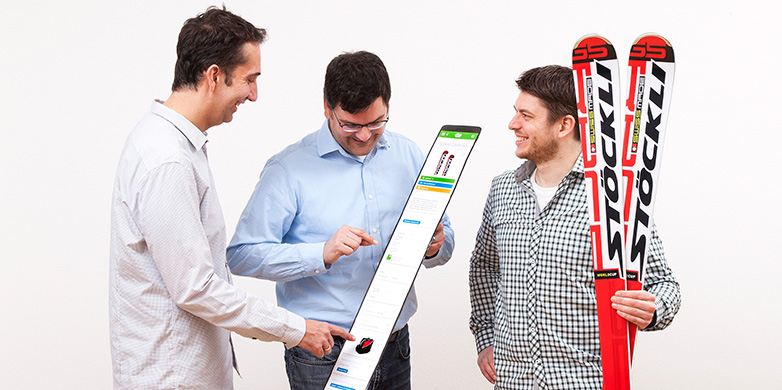The Internet of Favourite Things
ETH-Zurich spin-off Qipp uses virtual profiles to connect our favourite objects to the internet. Smartphones enable manufacturers to remain in contact with purchasers throughout a product’s entire lifespan.
Refrigerators that stock themselves, car tyres that indicate their air levels automatically, machines that call for maintenance – one day, the Internet of Things should connect all the objects around us to the internet, all thanks to the tremendous miniaturisation of sensors, chips and processors. After all, these days a tiny chip can fit into practical anything – even if it only be on a sticker.
What until recently was still reserved for research and industry is now finding its way to private users. The ETH-Zurich spin-off external page Qipp founded in 2012, which currently has nine members of staff, makes this possible. As a scientist at the Chair of Information Management at ETH Zurich, the founder, Stefan Zanetti, teamed up with Professor Elgar Fleisch to find the first commercial applications for the Internet of Things – and came to the following conclusion: “The Internet of Things is currently suffering under the necessity to incorporate sensors and communication modules into products, which has yielded highly specific applications until now.” Zanetti’s idea: why not simply compile virtual profiles for things on the internet instead of integrating microchips such as RFIDs in the objects?
With this in mind, he and his team programmed a platform upon which users have been able to enhance their favourite objects, such as bikes, handbags or electronic devices, with virtual representatives for the last few weeks. This enables all the useful information and services for the items, such as warranty certificates, operating instructions, maintenance and update reminders, individual notes or links to be stored. The Smartphone serves as a medium between the human, object and internet. Another advantage: the object profile is constantly updated with information from the internet, such as product add-ons, newly available accessories or current models. However, the Qipp web platform also serves as a kind of Facebook of favourite things: anyone who has an account can publish information about objects and share it with other Qipp users.
New producer-consumer relationship
The generation of “digital natives”, which has learned to navigate its way through life with a Smartphone, should especially be delighted by such a virtualisation of the material world – not least because the service is free. But how does the start-up earn any money from it? “Today, producers usually lose contact with their customers as soon as the product has been delivered,” explains Zanetti. “With our service, we create a direct relationship between producers and consumers that lasts for the product’s entire lifespan.” This is known as “post purchase service” in professional circles – and the ETH-Zurich spin-off wants to be paid for it.
Qipp furnishes products or packaging with a clear distinguishing feature, such as a QR code. As soon as the code has been read with the Smartphone camera, the product is added to the user’s own favourites profile. Via the internet, the manufacturer is now able to draw the users’ attention to new products and inform them about a recall or software updates.
One of the first six Qipp users is Philipp Schwander. The “Master of Wine” sells his own line of selected wines. If his customers or their guests are particularly fond of a wine, they can scan the Qipp label with their Smartphones. Not only do they receive a wealth of additional information on grape varieties and vineyards, but also the possibility of ordering the wine in one click. It goes without saying that this direct and straightforward way of selling products is attractive for traders. Therefore, it is hardly surprising that the first customers also include major companies such as Bosch and Swisscom. And, according to Zanetti, negotiations with over one hundred other companies are already underway.
Evaluating data for customer advice
But what about data privacy? After all, consumer goods companies are bound to be extremely interested in information on the Qipp user’s buying behaviour. Zanetti is pragmatic: every user can choose which data he or she discloses to producers via Qipp. The more data available, the more specific the producers’ virtual services. However, no data is sold to companies without asking for permission, assures the ETH-Zurich alumnus: “That would be curtains for us.” On the other hand, Qipp evaluates the anonymised data with a view to advising its business partners on consumer wishes and marketing. The automated real-time evaluation of enormous amounts of data also creates new possibilities in this field. Zanetti does not believe that Qipp contributes towards a dubious commodity cult and fuels consumption. Instead, he is convinced that the service could help products to be maintained better and thus used for longer.
